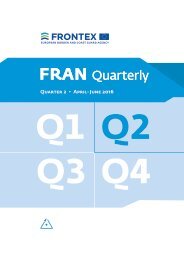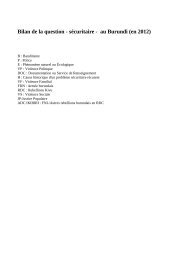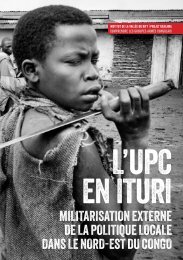Create successful ePaper yourself
Turn your PDF publications into a flip-book with our unique Google optimized e-Paper software.
PUBLIC POLLING<br />
tough challenges. Insecurity, intimidation, and outright mortal danger are<br />
the plausible if not predictable risks to would-be researchers, and to any willing<br />
informants, in such inhospitable terrain. As a result, while anecdotes<br />
about life under IS proliferate, precious little reliable or useful hard data is<br />
available about it.<br />
But not zero data. In fact, some notable efforts have been made to surmount<br />
these daunting obstacles, chiefly in the major original IS strongholds<br />
of Syria or Iraq. A few intrepid experts have actually conducted long-distance—admittedly<br />
imperfect, yet intriguing—surveys in Mosul and parts of<br />
Syria, using cellphones, Facebook, or other relatively anonymous means to<br />
contact respondents. Usually the samples are not textbook random ones but<br />
referral (also known as “snowball” or “chain-link”) samples, in which a few<br />
selected and trusted interviewers solicit information from an expanding network<br />
of contacts suggested by previous participants.<br />
To be sure, controls must be applied to reduce the unavoidably incestuous<br />
or self-selected nature and the built-in biases of such techniques—for example,<br />
degrees of separation, demographic quotas, and, most of all, explicit acknowledgement<br />
of their limitations. Frequently, given the practical difficulties, the<br />
samples are not only nonrandom but also small, typically comprising a few<br />
hundred, although online surveys may attract thousands of responses.<br />
The results of such IS-frontline field research in Syria and Iraq probably<br />
give some hints about local support or opposition to that organization in<br />
other provinces. Surveys conducted in Mosul by Iraqi pollster Munqith al-<br />
Dagher, who freely concedes their methodological limitations, suggest that<br />
many ordinary Sunni Arabs forced to live under IS rule are still opposed to<br />
anti-IS bombing raids by the coalition and fearful of “liberation” by Shiite or<br />
Kurdish militias. The point is that even if they do not support their IS overlords,<br />
some may prefer “the devil they know” to the danger and uncertainty<br />
of either urban warfare or conquest by another contending faction.<br />
Similarly, in Syria, small-scale private surveys of anti-IS Arab communities<br />
on the front lines also indicate widespread opposition to Kurdish militias,<br />
which are fighting against IS, too, but are nevertheless broadly distrusted.<br />
Less than a third of those Arab respondents support any alignment with the<br />
Kurds against the common IS foe. A slightly larger minority, but still less<br />
than half, recognize that the dominant Kurdish party must play some role in<br />
a post-IS Syrian political configuration. In other words, the enemy of their<br />
IS enemy is mostly not their friend.<br />
The anecdotal evidence is also mixed. Civilians fleeing besieged Tikrit,<br />
61






